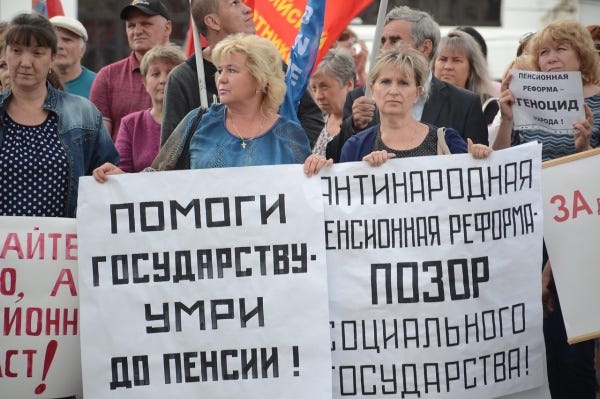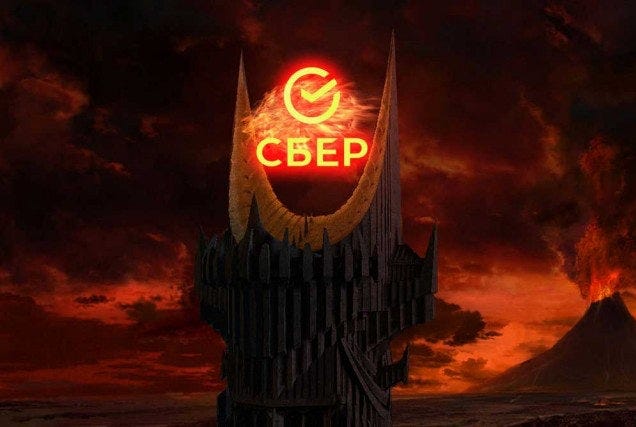Everyone on the internet understands the US economy is basically a massive Ponzi scheme kept afloat by endless paper-printing and Netflix; only a petrodollar shill would deny this.
But what’s the deal with Russia?
Yes, Russia’s Central Bank has a giant mountain of cash and shiny metal. Another fun fact about Russia: its government doesn’t run up insane deficits so it can drone-bomb ten different brown-people countries simultaneously. Frugal and shrewd.
A casual observer would conclude Washington is a teenage TikTok star who maxed-out her dad’s credit card, while Moscow didn’t go to college (which is a scam), got a job as a plumber, and has been quietly and prudently stacking delicious rubles. And there is certainly some truth to this statement.
But does any of this translate into socioeconomic stability for the average Russian? One would think it would—but people have a tendency to think all sorts of nutty things, like Sputnik V is safe and effective. (It’s not.)
The below article, written by economist Vladislav Zhukovsky, argues socioeconomic conditions are extremely unsavory in Russia right now—so much so that they could potentially trigger “protests and riots” similar to the upheaval witnessed in Kazakhstan.
Notably, our friends at Katyusha.org made a very similar observation. However, Katyusha’s analysis focused on how COVID measures could exacerbate already existing socioeconomic troubles in Russia. Zhukovsky, on the other hand, provides some depth to the severity of the current situation in his country, irrespective of cattle tags or compulsory injections.
We are open to running a counter-argument to this piece, by the way, if anyone can recommend one. But we found the below analysis quite sobering and thought, “this would be interesting for the blog.”
Truth is, we’re seeing more and more of these kinds of warnings while browsing the Russian Internet. How seriously should we take these warnings, though? This is obviously open to debate.
The population is rapidly impoverished. Do you want it to be like in Kazakhstan?
Sberbank has published the results of a survey from which it follows that less than 8% of citizens save money for old age, that is, only one in 13. Taking into account the statistics that Sberbank collects on money, deposits, transfers, transactions of the population, this is one of the most representative surveys. Although I think that even here the figures are embellished, in reality everything is much worse.
The result of this survey is a verdict on the socioeconomic and financial policies pursued by the ruling regime. By and large, the figures show that the population lives in absolute poverty, it is not even poverty. Because if 92% of Russians cannot make long-term savings, on the horizon of 30-40 years, at the time of retirement, then this means that people live from paycheck to paycheck, and at best they can save up for the treatment of their parents, the education of their children, the purchase of durable goods. And that is far from all—there are no more than 20% of them.
More than 65% of Russians have no savings at all, according to the Central Bank of Russia and independent sociological services. Therefore, 8%, which can be put off on a horizon of 30-40 years, is, of course, a sign of how depressed the economy is, how low our incomes are.
The real standard of living of Russians has been falling steadily since 2014, in 2021 it officially fell by more than 13.5% by 2020, and now the purchasing power of citizens’ incomes is below 2010. And in terms of foreign currency—below 2009. In this situation, when prices grow annually not by 4-5%, not by 8.5% (as Rosstat officially writes), but in reality, apparently, 2-4 times faster, people simply do not have the opportunity to save something for themselves to retire. God forbid to feed the family, pay for a communal apartment, pay a mortgage, buy more expensive potatoes (by 67% last year), cabbage (by 115%), chicken (by 32%), eggs (by 25%).
And people are simply in a state of constant struggle for survival, this is an eternal war not to starve to death, not to end up on the street. This is a terrible, terrible situation. The same Sberbank survey showed that pensions in the country are, in fact, some beggarly crumbs from the master's table—15-17 thousand rubles, although in the regions it can be in the region of 12-13 thousand, sometimes 10 thousand rubles. On this money it is impossible in principle to survive.
This suggests that, on the one hand, more than half of Russians do not trust the state pension system, they understand that the state is not able to provide them with a normal standard of living after retirement, and they themselves cannot save anything. They hope their children will be able to break out of this circle of poverty and be able to support their parents.
In general, our pension system is degrading before our eyes, the retirement age raised in 2018 is far from the limit, secondly, pension savings that have been frozen indefinitely since 2014 have been confiscated, for the eighth year they have been extending the freeze, and thus almost 4 trillion rubles were taken out of the pockets of the Russian people. The annual extension of the “freeze” takes almost 700 billion rubles that should have gone to individual pension savings accounts, but in fact they go into a common pool for current payments to pensioners. Plus, they raised the necessary minimum requirements for seniority, increased the period of survival in retirement. […]
And we will again be told that there is no money, but it exists. Over 70 billion dollars are exported from our country annually. Unofficially—about $ 150 billion through all channels. Plus, we need a progressive income tax scale, taxes on the super-rich, offshore, on dividend payments—this is a real modernization of the economy, the development of small businesses, entrepreneurship, and it is also essential to fight monopolies, oligopolies, reduce taxes on domestic production, on investments—all this can give huge revenues to the budget, but it is necessary to change priorities and step on the pocket of very big business, oligarchs and officials.
The authorities need only look at the events in Kazakhstan, because you can talk as much as you like about 20 thousand international pianists, guitarists and gangs [a reference to the Islamic State jazz pianist who was captured by Kazakh security forces], but, firstly, no one showed us these 20 thousand, no one took responsibility for this alleged invasion. Not a single country has confirmed that as many as two divisions of militants were deployed through their territory. That is, everyone understands that these rallies were originally of a peaceful national character, they began in industrial zones.
We are told that there is no money, but you hold on, tighten your belts, here you are raising the retirement age, raising taxes, VAT, excise duties, duties, and at the same time, the richest billionaires, oligarchs, earned more than $68 billion last year. The capitalization of their companies has grown, their wealth, their assets have risen in price by almost 5 trillion rubles, corporate profits have grown 2-3 times, according to official data from Rosstat. It turns out that a minority of the super-rich, these new feudal lords, are getting richer, while the rest of the population is getting poorer, although foreign exchange reserves have already exceeded $630 billion and are renewing historical highs.
The state, the budget, the oligarchs, exporters of raw materials, and state-owned banks are swimming in money, but the ordinary population is living worse and worse. The situation is frankly provocative, it can create an absolutely revolutionary situation in the country and cause protests and riots.
Source: nakanune.ru










My wife taught at a state university in a decent sized Siberian city teaching English. She had to take in outside work just to make ends meet--all the teachers did/do—at state universities. My wife’s cousin is a manager and his wife a prominent cardiologist, yet they just recently were able to buy a three room flat (2 small bedrooms and a living room, 1 bath, small kitchen area). When I walk around Russian cities, I see grannies and cripples begging for money or selling various items of no real value just for a few rubles more. When I go to a friend’s flat, the 5-story building they live in (built under Khrushchev) looks absolutely uninhabitable on the outside (and these buildings are ubiquitous). No one it seems responsible for anything outside an individuals place of residence. On the other hand, it seem most Russians own their own flats even if not much to speak of and a lot of families still have an allotment on which to grow food in summer.
The more I read and the more Russian people I talk to, the more I am coming to believe that Russia is Russia and it doesn’t matter whether the guy in charge is a Tsar, Commissar or President nothing will change. The Russian people are serfs (my wife agrees with me on this) and always will be. Other than a few minor changes, what is so different now than it was when Gogol was around? I have been to Russian villages and it seems not much different than the impression I got from reading Dead Souls.
Don’t worry though, we in the US are working hard to catch up with Russia, soon the economy will crash making 1929 look like a picnic and we will all be in the same boat.
WARNING - lengthy comment!
Edward - great topic to touch upon...
As usual, there is more to any story, same with the economic situation in Russia. First of all, we need to understand the background of the author of the article on Russian economy in the Nakanune.ru (translates as "on the eve") Vladislav Zhukovsky. I have been watching him for several years and have to say that he is one of the brightest among the young generation of Russian financial markets analysts. On top on all figures and statistics he has the ability to get his point across in a concise way. He did undergo a substantial political transformation, though, especially in the last couple of years, when he went from critiquing establishment from the liberal, almost libertarian positions to being a devout communist, assistant to Duma's deputy from CPRF (communists) Valery Rashkin, one of the harshest critics of the ruling United Russia party, that also got infamous last fall when he was caught poaching a moose in the forests of his electoral district near Saratov. Zhukovsky is a tireless critic of the economic policies of the establishment and his glass is always half full or the way he presents it glass is rather empty. So we need to take his conclusions and exclusively dark tones with which he depicts the state of Russian economy also with a grain of salt.
On the establishment's economic policies. I don't think that economic policies under Putin's rule can be described as disastrous. This term is more applicable to places like Venezuela, to a lesser degree Argentina, post-Soviet countries like Moldova and even Ukraine after Maidan of 2014. Russian economic development can be described as less than stellar and underperforming given all the natural advantages this country has compared to the most other nations. There are two major blocks that prevent Russia from posting much better economic results:
1. Country's president, Vladimir Putin, that doesn't understand how economy works, nor does he care to understand, since he is more interested in playing his 5D chess (at Edward likes to put it) with Xi, Biden, Modi, Erdogan and the rest of them.
2. As result of the point number one, but also by design, how previously unknown Putin was allowed to come to power in the late 90s, economic and financial policies were outsourced and remain under management of the liberal-monetarist block with Nabiullina, Siluanov, Kudrin, Gref, Shuvalov to name a few. Putin has publicly stated many times that he won't be telling Nabiullina how to run Central Bank and that she is doing admirable job.
As an outcome of the two obstacles I described above, Russia's economy is artificially slowed down by the strict adherence to IMF rules designed for (under)developed countries, keeping base interest rates very high, and sticking to the "Washington consensus" rules when its currency and overall economy is not allowed to become long term investment grade.
Now, what about Russians, how do they survive on an average salary by a working family member of $500? What is their perception, do they live well or do they live poorly? This is where observations start to diverge from some of the alarmist statements by the likes of Zhukovsky, Levchenko, Potapenko and the host of others. Based on survey conducted by Russian WCIOM (state social studies organization) published on 10/27/21 59% of Russians rate their economic situation as average, 25% see it as difficult and 15% see it as good. Can we trust these numbers, especially that they come from the state agency? To me they sound about right. But numbers aside, I can judge from my own family. Before the scamdemic, my younger half sister did very well in Moscow as a young designer-architect. She was renting a place not far from the Foreign Ministry building in the city center and overall was enjoying a glamorous lifestyle there. With the start of restrictions she had to come back home, to Kiev, where she continues doing all right, but perhaps not as good as in Moscow. My more distant relatives in the provincial, formerly miners town, in Rostov-on-Don region. My niece is a junior manager working for the Russian Post Office, her husband is an assistant train operator. Together they earn probably around $1000 take home salary per month. They have an 8 year old son. They've got a car, vacation at least twice a year in Turkey and Sochi and also in Caucasus during winter months. I don't know how they manage? Perhaps life is somewhat cheaper in Russia. Here in US, we, the family of 2 humans, 2 dogs and 2 cats spend at least $1000 - $1200 on food every month.